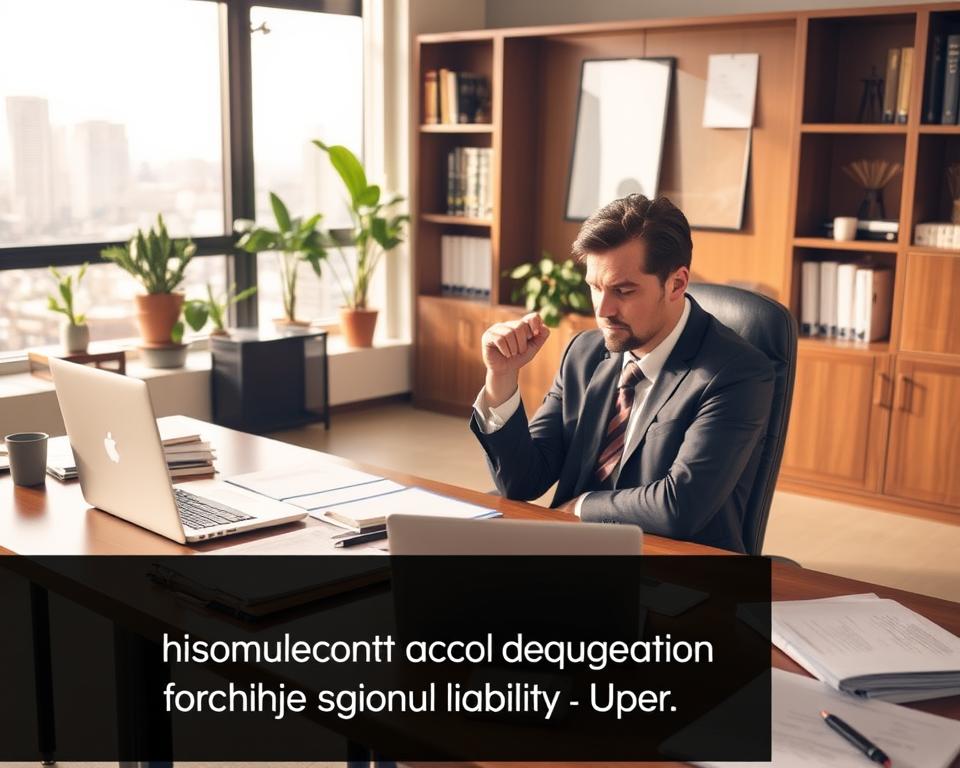Protect Your Practice: Accountants Professional Liability Insurance
In today’s complex financial world, accountants face many risks. These risks can harm their practice. Professional liability insurance is a key way to protect against these risks.
This insurance is essential for accounting firms. It helps protect them from financial losses due to mistakes, omissions, or negligence. With the right insurance, accountants can keep their practice safe and respected.
Key Takeaways
- Understanding the importance of professional liability insurance for accountants.
- Recognizing the risks that accounting practices face without proper insurance coverage.
- Learning how to protect your accounting firm from financial losses.
- Discovering the benefits of having the right insurance policy.
- Exploring the role of insurance in maintaining a reputable accounting practice.
What Is Accountants Professional Liability Insurance
Professional liability insurance for accountants protects against risks in their work. It’s key for accounting firms to guard against negligence, errors, or omissions claims.
Definition and Core Coverage Elements
Accountants Professional Liability Insurance, or professional indemnity insurance, pays for legal defense and settlements. It covers:
- Professional negligence
- Errors and omissions
- Breach of contract
- Negligent misrepresentation
How It Differs from General Business Insurance
Accountants Professional Liability Insurance is different from general business insurance. It focuses on risks specific to accounting, not property damage or bodily injury. This specialized insurance is vital for accounting professionals.
Legal Requirements for Accounting Professionals in the US
In the US, laws about accounting professional liability insurance vary by state. Some states require it for accounting firms to operate. Even if not required, it’s wise to have it to protect against risks.
| State | Requirement |
|---|---|
| California | Mandatory for CPA firms |
| New York | Recommended but not mandatory |
| Texas | Required for certain services |
The table shows how different the requirements are. Accounting professionals need to know their state’s laws to follow them.
Identifying Key Risks in Your Accounting Practice
Knowing the main risks in your accounting work is key for good risk management for accountants. Spotting possible dangers lets you act early to lessen them. This helps keep your business safe from money losses.
Assessing Client-Related Exposures
Client-related risks are big for accounting firms. These risks include mistakes in financial reports, wrong tax law interpretations, or missing fraud. Think about the services you give and how complex your clients’ money situations are.
Evaluating Technology and Data Security Risks
More tech use in accounting brings new data security risks. Cyber attacks, data leaks, and system crashes can harm client info and mess up your work. It’s vital to have strong security steps to fight these dangers.
Recognizing Regulatory Compliance Vulnerabilities
Accounting firms must follow many rules, like tax laws and financial standards. Not following these can lead to fines, penalties, and harm to your reputation. Keeping up with these rules helps avoid these problems.
Measuring Third-Party Claim Possible
Third-party claims can come from clients, vendors, or others. To gauge this risk, think about claims against your work, like negligence or contract breaches.
| Risk Category | Description | Mitigation Strategies |
|---|---|---|
| Client-Related Exposures | Errors in financial reporting, misinterpretation of tax laws | Implement quality control procedures, provide ongoing training to staff |
| Technology and Data Security Risks | Cyberattacks, data breaches, system failures | Implement robust security measures, conduct regular backups |
| Regulatory Compliance Vulnerabilities | Failure to comply with regulations, tax laws, financial reporting standards | Regularly review and update knowledge of relevant regulations, engage compliance experts |
By tackling these main risks, accounting firms can shield themselves from losses. This keeps their reputation strong in the field.
How to Select the Right Accountants Professional Liability Insurance
Understanding accountants professional liability insurance is key to making a good choice. There are many options, so it’s important to think about what your practice really needs.
Determining Appropriate Coverage Limits
Finding the right coverage limits is essential. You need to consider your practice’s size, the services you offer, and the risks involved. Adequate coverage limits help protect your practice from financial loss if a claim is made.
Comparing Claims-Made vs. Occurrence Policies
It’s also important to know the difference between claims-made and occurrence policies. Claims-made policies cover claims made during the policy period. Occurrence policies cover incidents that happen during the policy period, even if the claim is made later. The right policy for you depends on your practice’s needs and situation.
Evaluating Extended Reporting Period Options
Extended reporting period options, or tail coverage, offer extra protection. They are important if you’re switching insurers or retiring. It’s important to understand the costs and benefits of extended reporting periods when choosing the right liability insurance.
Analyzing Defense Costs Coverage
Defense costs coverage is also a key part of accountant liability insurance. It helps pay for legal costs when defending against a claim. Knowing how defense costs are handled can greatly affect your practice’s financial stability during a claim.
By carefully looking at these factors, you can make a smart choice when picking accountants professional liability insurance. This ensures your practice is well-protected against risks.
Step-by-Step Guide to Purchasing Liability Insurance
Getting liability insurance might seem hard, but it’s easy with the right help. Accountants need professional liability insurance to protect against mistakes or errors. It’s key for managing risks.
Preparing Your Practice Information
Start by getting all your practice details ready. You’ll need financial info, what services you offer, and how many clients you have. This makes applying for insurance easier.
Researching and Contacting Insurance Providers
Look for insurance companies that focus on accountants. Compare their policies, coverage, and prices. Reading reviews and asking for advice from other accountants can also help.
Completing Applications and Underwriting Requirements
Choose your insurance providers and fill out their applications. You’ll need to share a lot about your practice. Be ready to talk about how you manage risks.
Reviewing and Negotiating Policy Terms
When you get offers, check the details carefully. Talk about coverage, deductibles, and costs if needed. Knowing your policy well is important for your protection.
By following these steps, accountants can get the right liability insurance. It’s a smart move for the future of their business.
Implementing Risk Management Strategies
Effective risk management is key for accounting firms to avoid big losses and stay successful. By using strong risk management plans, firms can keep their good name and financial health safe.
Creating Quality Control Procedures
Setting up quality control steps is a big part of managing risks. This means:
- Checking workpapers and financial statements often
- Using checklists and review steps
- Using tech to make tasks easier and faster
Developing Clear Client Engagement Letters
It’s important to have clear client engagement letters. These letters should:
- Clearly say what work will be done
- State the rules and terms of the job
- Include any important warnings or disclaimers
Establishing Documentation Protocols
Keeping detailed and correct records is essential for accounting firms. This includes:
- Using the same format for all documents
- Recording financial data on time and correctly
- Having safe ways to store and get documents
Conducting Regular Staff Training
Training staff regularly is important to make sure they know and follow risk management rules. Training should:
- Teach about laws, rules, and standards
- Focus on the best ways to manage risks and keep quality high
- Use real-life examples to help staff understand better
By using these risk management strategies, accounting firms can lower their risk of problems and get stronger.
How to Handle a Professional Liability Claim
When a professional liability claim comes up, it’s important to act fast and well. You need to take a detailed approach. This includes quick action, working with your insurance, and keeping good relations with clients.
Immediate Steps When a Claim Arises
Right away, tell your insurance provider about the claim. Start the process. Also, write down all important details like dates, times, and what the claim is about.
- Look over the claim to know what it’s about.
- Collect all important documents and evidence.
- Let your insurance provider know and start the claims process.
Working with Your Insurance Provider
Your insurance provider will help you through the claims process. Be ready to give them all the details and help them as they ask. Good communication is key to solving the claim quickly.
Managing Client Relationships During Claims
Keeping a good relationship with your client is very important, even when there’s a claim. Be open and professional to manage their expectations and keep their trust.
Learning from Claims to Improve Practice Procedures
After fixing a claim, it’s important to do a deep review to find ways to get better. Making changes based on what you learned can help avoid future claims.

Conclusion: Securing Your Accounting Practice’s Future
As an accountant, keeping your practice safe is key to success. Liability insurance is a big help in protecting your business from expensive lawsuits. Knowing the risks and managing them well can keep your practice stable for the future.
To keep your firm ahead, you need to act now. Choose the right insurance, follow quality control, and keep up with laws. These steps will help your practice grow and stay competitive.
Protecting your practice is more than just insurance. It’s about making your business a place of trust and compliance. This way, you not only safeguard your business but also build a strong reputation. This forward-thinking will help you succeed in the complex world of accounting.









